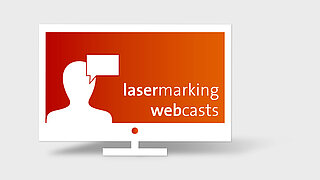Webinar: Customized Automation in Laser Marking
FOBA Expert Talk on October 21, 2021, to present robot assisted laser marking solutions

Webinar: Customized Automation in Laser Marking
The automation of part handling or mark alignment in a laser marking process can help improve marking requirements and save production cost. In the context of demanding traceability marking requirements like the UDI (Unique Device Identification) of medical devices, direct part marking is on the rise. Therefore, laser marking system provider FOBA offer technical solutions, some in cooperation with automation experts, that make laser marking even more efficient.
In a webinar on October 21 at 9 am (CDT), FOBA will demonstrate the practical use of technology features and examples of automation of laser marking. Laser marking expert Dr. Faycal Benayad-Cherif will explain the challenges, limitations and solutions of combining laser marking and automation, from collaborative robots to fully automated solutions. Commercial solutions include automated loading and unloading, part feeders, and conveyor systems that help manufacturers obtain error-free and repeatable laser marking results around the clock.
The registration for FOBA’s free webinar “Automation Expert Talk: Automation and medical device manufacturing – What you need to know.” is available on https://page.fobalaser.com/FOBA-WBN-Experttalk-Automation-2021-EN-EN_WBN-LP-Registration-Extern-EN.html
-------------
Find the replay of the webinar for free download at https://page.fobalaser.com/FOBA-WBN-Experttalk-Automation-2021-EN-EN_WBN-LP-OnDemand-EN.html
Background: Automation in laser marking – more than robotics
Automation processes related to laser marking include, besides the loading and unloading of a marking station from the outside, also pick and place operations within a closed marking unit, as well as stacking or sorting, but also a subsequent packaging and cleaning. Depending on the degree of human interaction, a distinction is made between semi-automated and fully automated systems.
In addition to the automation of parts handling, the automation of the marking process itself also plays an important role. This primarily involves the exact positioning of the laser mark at the intended position on the product with the help of an integrated camera and corresponding software. The intention is not only to minimize human interaction, but also to make the process repeatable with consistent accuracy.
"As a pioneer in the field of camera-based laser marking, FOBA has already enabled a certain degree of automation of the marking process for many years," says Markus Vetter, FOBA product manager. This primarily concerns mark alignment by automated optical inspection, enabling the exact placement of the mark in relation to the component, as well as software-controlled quality checks from the beginning to the end of the marking process.
Process control through camera and software features
The integration of the camera directly into the marking head ensures distortion-free imaging, the prerequisite for precise marking through automatic positioning and orientation of the marking contents. At the same time, the software performs visual inspection of all parts prior to marking to prevent false marking, as well as a downstream readback of the marked codes for quality and content control.
Certain software functions such as Mosaic, part of the FOBA MarkUS marking software, are capable of accurately marking a product located anywhere in the marking field. This not only saves time and effort in manually aligning the product to the laser, but also the considerable cost of manufacturing and equipping the respective product holders (fixtures).
In medical device manufacturing for instance, there is a great variety, both in terms of the type and shape of the products, their material or also the production quantities with often small batch sizes. Consequently, the requirements for marking and the degree of automation of the marking process also vary.
"We always see our task first in providing profound advice and analysis of our customer’s requirements. If we are then unable to offer a suitable solution with our own technical department, we recommend the appropriate partner with the necessary expertise," explains Son Tran, FOBA Sales Manager Europe. "By expanding our portfolio to include semi-automated loading and unloading processes, FOBA is further meeting current customer needs for automation," adds Markus Vetter, explaining FOBA's cooperation with robot manufacturers and automation partners.
Technical consultation based on profound industrial experience
A prerequisite for the interaction of laser marking system and robot or automation system is a technically smooth interface connection of both systems. "Our laser marking systems contain sophisticated interfaces and can be integrated very well into automation units or connected to robots or other systems. This functionality is based on our experience with a wide variety of production environments," explains Son Tran.
"In addition, at FOBA, all elements of the marking process, including the camera and illumination, are controlled by a single software. This means that our customers do not operate their process with different programs, which is an advantage in many cases," FOBA’s sales manager adds. Furthermore, the integrated camera also reduces the effort of validating the marking process, as no additional validation is required for a separate camera software. FOBA considers this to be a great advantage in the required medical device qualification process.
Several examples from industrial practice show that there are solutions for a wide variety of marking requirements. "The cooperation partners named here to develop automation solutions together with FOBA are representative of a range of global partnerships," explains Product Manager Markus Vetter. The selection of the appropriate marking system and possible automation depends on the type and quantity as well as the material of the workpieces, the required size of the marking field and the desired visual inspection before, during and after marking. Fiber laser marking systems such as FOBA Y.0201, the so-called "universal laser," are particularly suitable for versatile applications in many industries.
More information about the automation of laser marking at FOBA: https://www.fobalaser.com/products/automation/
FOBA Laser Marking + Engraving
www.fobalaser.com
Download
| File Name | File Size | File Type |
|---|---|---|
|
Media release EN (doc)
.docx,
756 KB
|
756 KB | docx |
|
Media release EN (pdf)
.pdf,
767 KB
|
767 KB | |
|
fruitcore_AB_addn-solutions_01.jpg
.jpg,
2,83 MB
|
2,83 MB | jpg |
|
Zeltwanger_Cobot_M1000__003_.jpg
.jpg,
1,11 MB
|
1,11 MB | jpg |